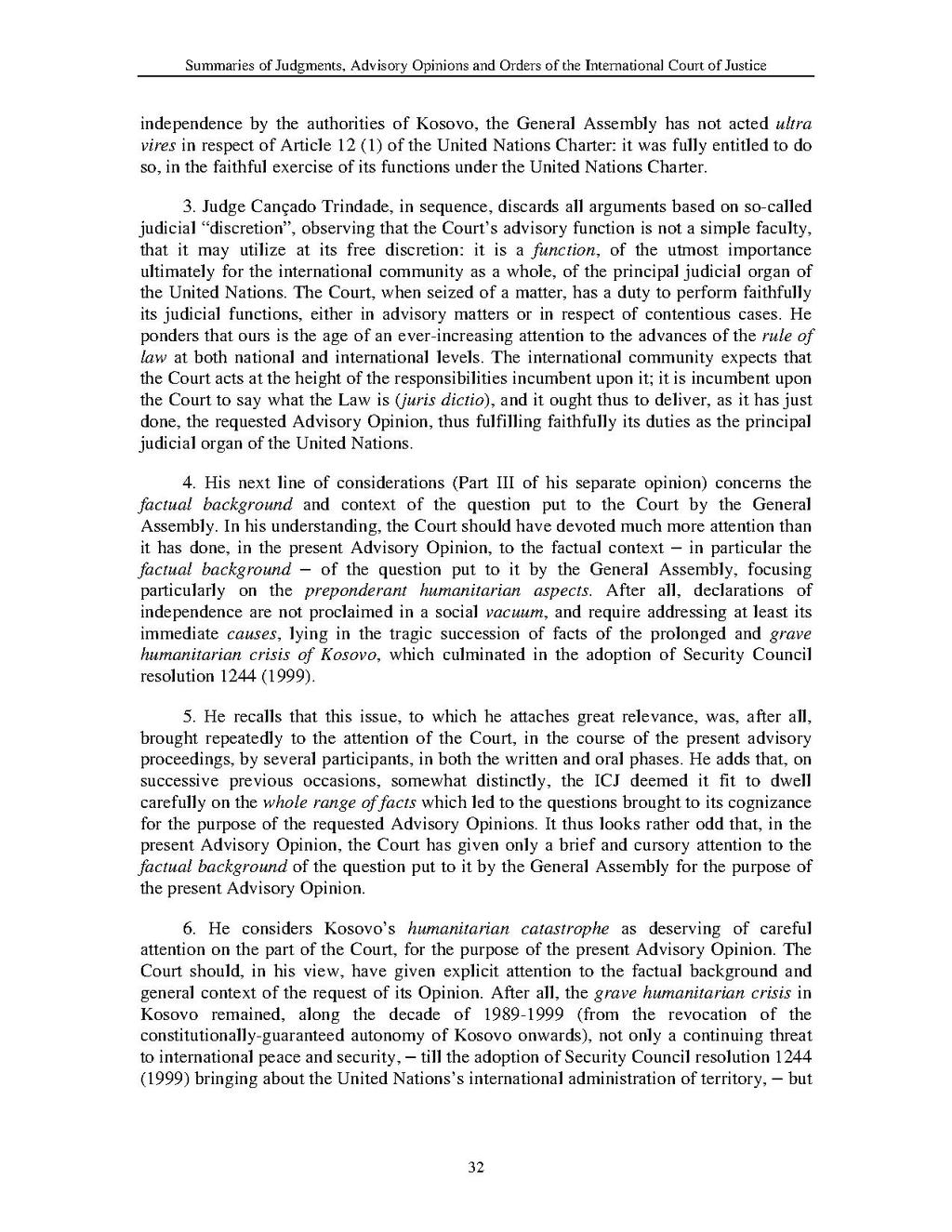Summaries of Judgments, Advisory Opinions and Orders of the International Court of Justice
independence by the authorities of Kosovo, the General Assembly has not acted ultra vires in respect of Article 12 (1) of the United Nations Charter: it was fully entitled to do so, in the faithful exercise of its functions under the United Nations Charter.
3. Judge Cançado Trindade, in sequence, discards all arguments based on so-called judicial "discretion", observing that the Court's advisory function is not a simple faculty, that it may utilize at its free discretion: it is a function, of the utmost importance ultimately for the international community as a whole, of the principal judicial organ of the United Nations. The Court, when seized of a matter, has a duty to perform faithfully its judicial functions, either in advisory matters or in respect of contentious cases. He ponders that ours is the age of an ever-increasing attention to the advances of the 'rule of law at both national and international levels. The international community expects that the Court acts at the height of the responsibilities incumbent upon it; it is incumbent upon the Court to say what the Law is (juris dictio), and it ought thus to deliver, as it has just done, the requested Advisory Opinion, thus fulfilling faithfully its duties as the principal judicial organ of the United Nations.
4. His next line of considerations (Part III of his separate opinion) concerns the factual background and context of the question put to the Court by the General Assembly. In his understanding, the Court should have devoted much more attention than it has done, in the present Advisory Opinion, to the factual context – in particular the factual background – of the question put to it by the General Assembly, focusing particularly on the preponderant humanitarian aspects. After all, declarations of independence are not proclaimed in a social vacuum, and require addressing at least its immediate causes, lying in the tragic succession of facts of the prolonged and grave humanitarian crisis of Kosovo, which culminated in the adoption of Security Council resolution 1244 (1999).
5. He recalls that this issue, to which he attaches great relevance, was, after all, brought repeatedly to the attention of the Court, in the course of the present advisory proceedings, by several participants, in both the written and oral phases. He adds that, on successive previous occasions, somewhat distinctly, the ICJ deemed it fit to dwell carefully on the whole range of facts which led to the questions brought to its cognizance for the purpose of the requested Advisory Opinions. It thus looks rather odd that, in the present Advisory Opinion, the Court has given only a brief and cursory attention to the factual background of the question put to it by the General Assembly for the purpose of the present Advisory Opinion.
6. He considers Kosovo's 'humanitarian catastrophe as deserving of careful attention on the part of the Court, for the purpose of the present Advisory Opinion. The Court should, in his view, have given explicit attention to the factual background and general context of the request of its Opinion. After all, the grave humanitarian crisis in Kosovo remained, along the decade of 1989-1999 (from the revocation of the constitutionally-guaranteed autonomy of Kosovo onwards), not only a continuing threat to international peace and security, – till the adoption of Security Council resolution 1244 (1999) bringing about the United Nations's international administration of territory, – but
32
